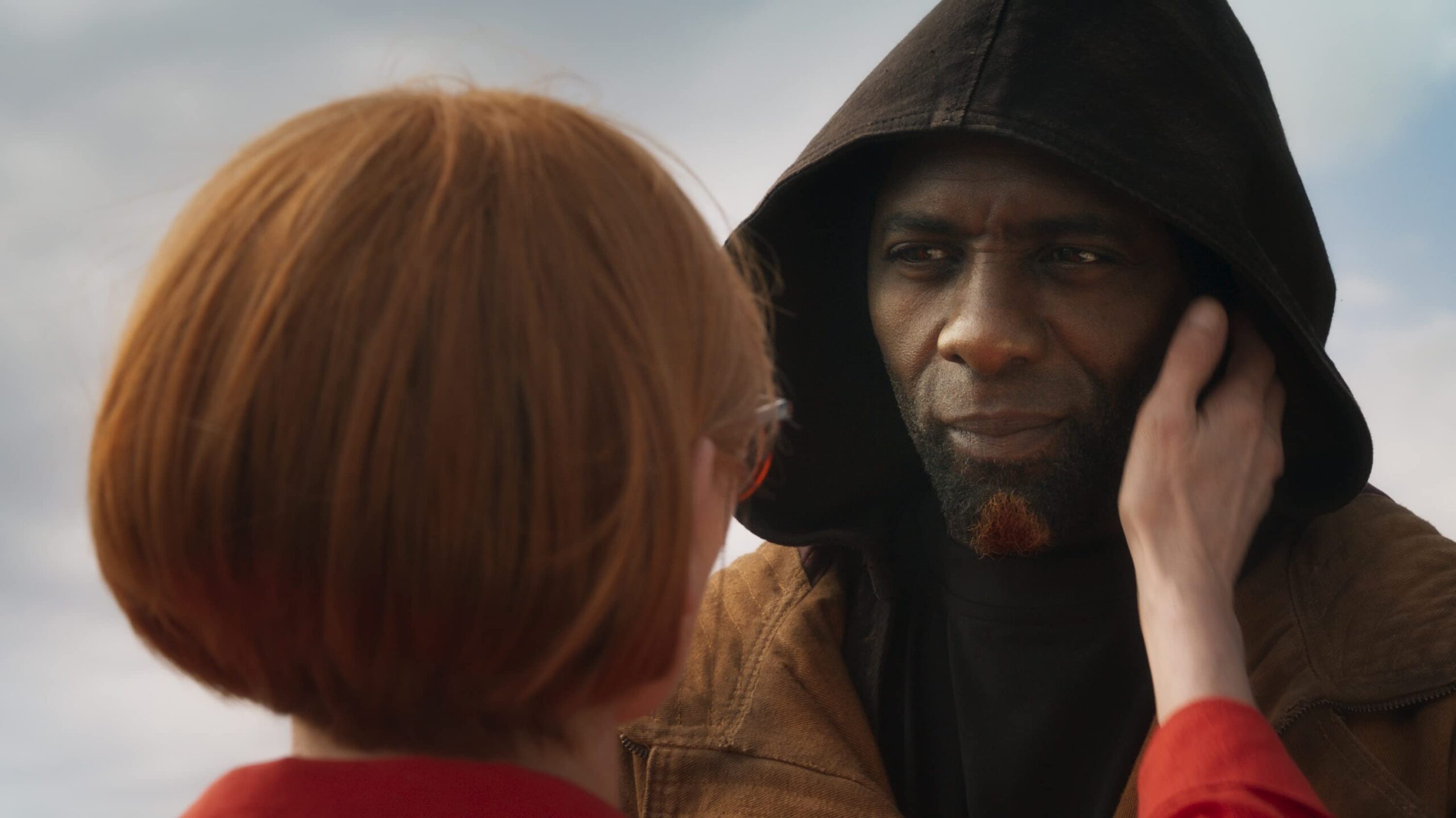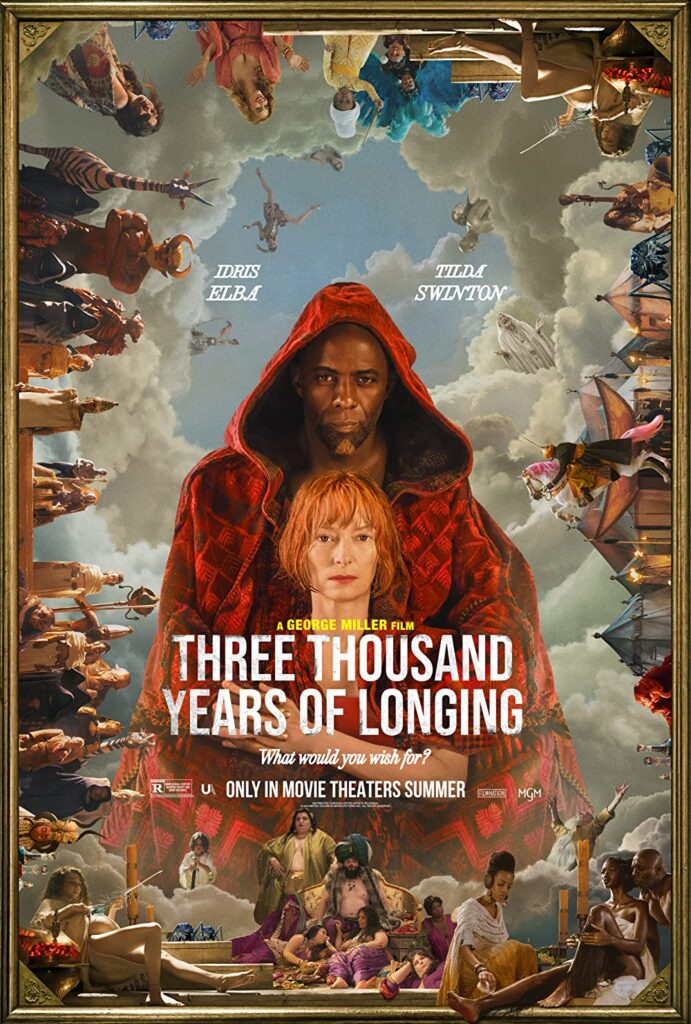The world is a weird place. Everything is strange. Life. People. All of it. This has never been more apparent than the past few years. The COVID-19 pandemic trapped people in their homes, away from family and friends. The world went quiet, while our minds got louder. It is an experience shared by all. Some affected more than others, but a unified moment in history nonetheless. As the world slowly progresses back to some form of normality, one thing that everyone has gained from this experience is a story. Their story. Whether it be good or bad, happy or sad, everyone has a story. And few things are more intimate than sharing your story.
So, when Alithea (Tilda Swinton), a narratologist with a keen understanding of the power of stories, finds herself in an Istanbul hotel room with a Djinn (Idris Elba), he tells her his story. The story of how he found himself inside the bottle she so happened to stumble across in the back room of a small store in a pile of artifacts, all in the hopes that she will accept his three wishes in exchange for his utmost desire; freedom.
Three Thousand Years of Longing comes from the brilliant mind of George Miller, who has followed up his action masterpiece Mad Max: Fury Road with this strange and fascinating work. Oftentimes the films that stay with audiences the most are those that aren’t always water tight, but instead find themselves leaking into the mind and finding roots to be dissected and pondered. Three Thousand Years of Longing is one of those films.
Miller, along with writing partner (and daughter) Augusta Gore have crafted something rather admirable with this adaptation of A.S. Bryatt’s story The Djinn in the Nightingale’s Eye. First and foremost, this was a COVID production through and through. Despite this, however, Miller and crew did a tremendous job to hide the fact. While there may be some visual effects that may not feel as perfectly polished as other films, that adds to the fantastical feel to the film. Through Miller’s direction, along with John Seale’s cinematography (who previously worked on Fury Road with Miller), the film is a visual feast from beginning to end. It is also an auditory marvel with some incredible sound design, paired with Tom Holkenborg’s (aka Junkie XL) hypnotic score. There is also an immense attention to detail in the film, hiding little pieces of information and story within set decoration and production design, which will provide an extra depth to the more keen-eyed viewer.
Where the true charm of the films lies, however, is in the subtleties of its story. As mentioned, the film is essentially a collection of stories. Told by Idris Elba as The Djinn, he shares the narrative of his life’s journey across thousands of years, telling of all the people he met and the world he saw. From his days spent by the side of the Queen of Sheba before being imprisoned to the bottle by the one she desired, King Solomon, through to his time spent in a room of knowledge with a woman who wanted nothing more than all the knowledge in the world, the Djinn’s stories are nothing more than a cautionary tale to the ears of Tilda Swinton’s Alithea. One who shares her story of marriage long forgotten and a tale of her once imaginary companion who faded with her attempts to write him into existence.
Because of this, the film ultimately rides on the backs of these two lead performances, who both mesmerize in this bedtime story type film. Both Elba and Swinton give subdued and vulnerable performances as they share their time together and exchange these stories of desire. Through their conversations, the viewer is slowly let into the characters’ psyche. Where the Djinn wants nothing more than for Alithea to make her three wishes and finally set him free, Alithea feels as though her heart desires nothing. This, of course, proves itself to be false as Alithea finds a piece of her story within The Djinn’s final tale. It is here that we find what Alithea longs for and it’s within her character arc that the key to the entire film lies.
In the instantaneous world of today, George Miller has caused an intriguing divide in audiences with Three Thousand Years of Longing. Whether by design or through the sheer ambition of the project, there is something very interesting to take away from the reactions to the film. Where many have expressed a feeling of frustration with the film’s message being unclear, others have shown a true interest in what the film has to say.
While this is almost always going to be up to interpretation, Three Thousand Years of Longing feels like Miller’s commentary on the world of today and how it longs for more even after evolving so much in such a short amount of time. Where we once needed magic to understand the universe, The Djinn finds himself lost in the modern world of information and technology. He feels overwhelmed by the constant noise of the world and its advances. However, through all things learned and despite these scientific narratives, it is destined that there will always be something more to desire. Alithea believed she had everything she wanted, but after learning about the world through the eyes of The Djinn, it can be seen that there is always something left to be desired. Perhaps now more than ever.
Of course, this is just one of many ways to interpret the film. And that is where Three Thousand Years of Longing has shown to be something rather special. While its overall narrative may not be as hard hitting or gripping as its visual marvels, there is an admirable dedication to its story and a commendable effort in what George Miller has crafted. And in a world that always desires for more ‘stuff’, this is a story that is worth spending the time to sit down and listen to based on that alone.
Director: George Miller
Cast: Tilda Swinton, Idris Elba, Matteo Bocelli
Writers: George Miller, Augusta Gore, (Based on The Djinn in the Nightingale’s Eye by A.S. Byatt)




